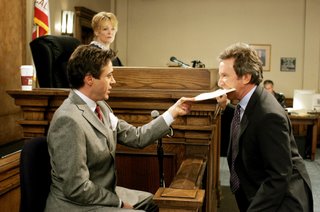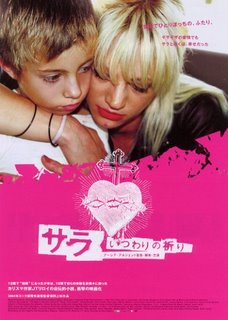Media Mom on Thank You for Smoking (Chicago Tribune)
`Smoking' is about thinking for yourself
By Nell Minow
Special to the Tribune
Published March 30, 2006
"Thank You For Smoking" is a satire with particular bite in Washington these days, as it hinges on the exploits of Nick Naylor, a seemingly soulless tobacco lobbyist.
But though lobbying scandals have been in the news recently, that's just a coincidence, say the film's creators.
"This film is about parenting more than it is about cigarettes," said screenwriter/director Jason Reitman. "You can select your friendships, you and your wife can get divorced, you can distance yourself from your family and surround yourself with people who agree with you, but you can't separate yourself from your kid." At the heart of the story is an indictment of "the Yuppie Nuremberg defense," which is how the film refers to characters who use "I'm just trying to pay the mortgage" as a moral rationale. The film makes it clear that the "mortgage" excuse is one way of saying we want to care for our families.
But it also points out the yearning to be someone our children will respect and want to live up to.
The example set by parents is clearly an important issue for both Reitman and for Christopher Buckley, author of the best-selling book on which the film is based. Both followed well-known and highly accomplished fathers in their choice of careers: Ivan Reitman is a Hollywood producer and director ("Animal House," "Ghostbusters"), and William F. Buckley is a writer and editor (National Review, "God and Man at Yale," the Blackford Oakes series of spy novels).
In the movie, Nick tells his young son Joey that what matters most is thinking for yourself.
"It's not a pro-smoking movie; it's not an anti-smoking movie. It's about political correctness," Buckley said. His inspiration for the book was a woman from the Tobacco Institute he saw on what was then called the "The MacNeil/Lehrer NewsHour" on PBS. She was responding to yet another set of statistics about the harm caused by cigarettes. When Buckley heard her say, "We try to work with these so-called scientific organizations," he says, "I fell in love. What an interesting job that must be."
Buckley met with her, and "the Yuppie Nuremberg defense" sprang from their conversation.
"I said, `There's a question I'm dying to ask but I feel a little awkward.' She said, `I know. What is a nice girl like me doing in a place like this? I'm just trying to pay the mortgage,'" Buckley recalls.
"Who at age 10 wanted to grow up and be a tobacco lobbyist?" he asks.
"Life has a way of inflicting compromise on us. I recently saw former Congressman Howard Baker greeted by another Washington lion, who said, `Howard, I hear you're flying the flag for Toshiba these days!' Bob Dole was doing Viagra ads. It's always about the mortgage. The world would really be better off if everyone rented."
"I couldn't have invented [disgraced lobbyist] Jack Abramoff," Buckley says. "It seems curious that the movie is coming out as a big Washington lobbying scandal is unfolding. There's a weird fortuitousness, but it's a different cat. [Tobacco lobbyist] Nick's not in it for the money. He has a weird nobility, a kind of defiance, and a libertarian streak. He doesn't like being told what to think or do."
In the film, Nick and his only friends, the lobbyists for the gun and alcohol industries, are not the only ones who have to decide what compromises they will have to make to pay the mortgage. Among other characters facing some moral quandaries in the film are anti-smoking crusaders -- a senator from Vermont and Lorne Lutch, the one-time star of a series of cigarette ads, now dying of lung cancer.
In one of the movie's key scenes, Naylor brings the former advertising icon of independent cowboy spirit a suitcase full of money. At first, Lutch refuses the money. Naylor begins by agreeing with Lutch and the next thing you know, Lutch is switching positions.
"That scene is absolutely artistic," Buckley says. "Naylor walks him through a series of doors until he finds himself saying, `I don't suppose I could denounce you for half the money.'"
Reitman wanted Sam Elliott, best known for cowboy-loner roles in films such as "The Hi-Lo Country" and "Tombstone," to play Lutch. Elliott at first said no, for moral reasons. He did not think the character should accept the money.
Reitman went to talk to him, knowing he had to be every bit as persuasive as his fictional lobbyist.
"You've played these noble characters your whole life," Reitman told Elliott. "This is a real character, vulnerable."
Elliot took the role, and Reitman thinks that his scene is the best one in the film. The characters are "doing this complicated dance, almost like choreography. The control is constantly switching. Who has the power? It switches every four or five lines."
Reitman says he chose Buckley's book because, "I'd never read anything that funny that was kind of brashly libertarian. It seemed to be a book about taking responsibility for your actions. Nick at first says he does it to pay the mortgage, but he cares about his son and teaches his son to be a decent human being."
"Joey gives [Nick] a chance to be a parent, to teach him to be an independent thinker. You can't just say to your kids `Don't smoke.' You have to teach them to make decisions. Joey is a window into Nick's soul."
----------
Nell Minow reviews movies each week as The Movie Mom for Yahoo! Movies and for radio stations across the country. She can be reached at moviemom@moviemom.com.








